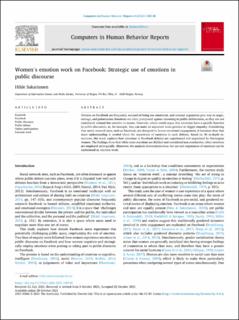| dc.contributor.author | Sakariassen, Hilde | |
| dc.date.accessioned | 2022-01-21T07:21:33Z | |
| dc.date.available | 2022-01-21T07:21:33Z | |
| dc.date.created | 2021-11-26T12:49:02Z | |
| dc.date.issued | 2021 | |
| dc.identifier.issn | 2451-9588 | |
| dc.identifier.uri | https://hdl.handle.net/11250/2838577 | |
| dc.description.abstract | Debates on Facebook are frequently accused of being too emotional, and rational arguments give way to anger, outrage, and polarisation. Emotions are often juxtaposed against reasoning in public deliberation, as they are not considered rational but coercive in nature. However, others would argue that emotions have a specific function in public discussion, as, for example, they can make an argument more genuine or trigger empathy. Considering that social network sites, such as Facebook, are designed to favour emotional engagement, it becomes clear that more understanding is needed about the experience of emotions in such debates. Based on 30 in-depth interviews, this study explores how emotions in Facebook debates are experienced and negotiated by Norwegian women. The findings show that while some emotions are disliked and considered non-conductive, other emotions are employed strategically. Moreover, the analysis demonstrates how the use and negotiation of emotions can be understood as emotion work. | en_US |
| dc.language.iso | eng | en_US |
| dc.publisher | Elsevier | en_US |
| dc.rights | Navngivelse 4.0 Internasjonal | * |
| dc.rights.uri | http://creativecommons.org/licenses/by/4.0/deed.no | * |
| dc.title | Women's emotion work on Facebook: Strategic use of emotions in public discourse | en_US |
| dc.type | Journal article | en_US |
| dc.description.version | publishedVersion | en_US |
| dc.rights.holder | Copyright 2021 The Author(s) | en_US |
| dc.source.articlenumber | 100148 | en_US |
| cristin.ispublished | true | |
| cristin.fulltext | original | |
| dc.identifier.doi | 10.1016/j.chbr.2021.100148 | |
| dc.identifier.cristin | 1959730 | |
| dc.source.journal | Computers in Human Behavior Reports | en_US |
| dc.identifier.citation | Computers in Human Behavior Reports. 2021, 4, 100148 | en_US |
| dc.source.volume | 4 | en_US |

